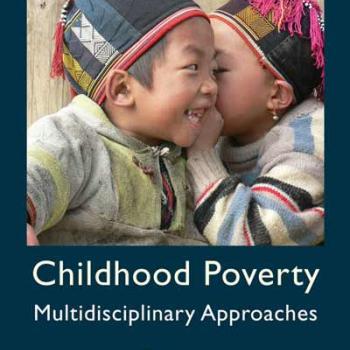Publication Information

This chapter reports on research carried out with boys and girls, aged 12 to 15, participating in Young Lives in the southern Indian state of Andhra Pradesh. It focuses on young people?s descriptions, explanations, and experiences of poverty and inequality in two contrasting rural communities and highlights implications for research, policy and practice, and rights. Young people growing up in poor communities are generally alert to inequalities and injustices, and to their own disadvantaged situations. The research presented in this chapter indicates that children perceive material inequalities as indicative of wider differences in power and position, of which they are very much a part. Children?s concerns, explanations, and experiences of the effects of poverty may differ from those of adults, and children often have distinct roles and responsibilities within their families for managing hardship and risk related to household poverty (for example, caring for siblings, carrying out essential household chores, working for pay, and going to school). There may also be important differences in patterns of children?s awareness and understanding of inequality, reflecting their varied positioning in the social hierarchy and the range of social expectations they manage (related, for example, to age, gender, class, and ethnicity, or caste).
Reference: Crivello, Gina, Uma Vennam, and Anuradha Komanduri (2012) ''Ridiculed for not having Anything': Children's Views on Poverty and Inequality in Rural India', in Jo Boyden and Michael Bourdillon (eds) Childhood Poverty. Multidisciplinary Approaches (pp.218-236). Basingstoke: Palgrave Macmilllan.

This chapter reports on research carried out with boys and girls, aged 12 to 15, participating in Young Lives in the southern Indian state of Andhra Pradesh. It focuses on young people?s descriptions, explanations, and experiences of poverty and inequality in two contrasting rural communities and highlights implications for research, policy and practice, and rights. Young people growing up in poor communities are generally alert to inequalities and injustices, and to their own disadvantaged situations. The research presented in this chapter indicates that children perceive material inequalities as indicative of wider differences in power and position, of which they are very much a part. Children?s concerns, explanations, and experiences of the effects of poverty may differ from those of adults, and children often have distinct roles and responsibilities within their families for managing hardship and risk related to household poverty (for example, caring for siblings, carrying out essential household chores, working for pay, and going to school). There may also be important differences in patterns of children?s awareness and understanding of inequality, reflecting their varied positioning in the social hierarchy and the range of social expectations they manage (related, for example, to age, gender, class, and ethnicity, or caste).
Reference: Crivello, Gina, Uma Vennam, and Anuradha Komanduri (2012) ''Ridiculed for not having Anything': Children's Views on Poverty and Inequality in Rural India', in Jo Boyden and Michael Bourdillon (eds) Childhood Poverty. Multidisciplinary Approaches (pp.218-236). Basingstoke: Palgrave Macmilllan.

